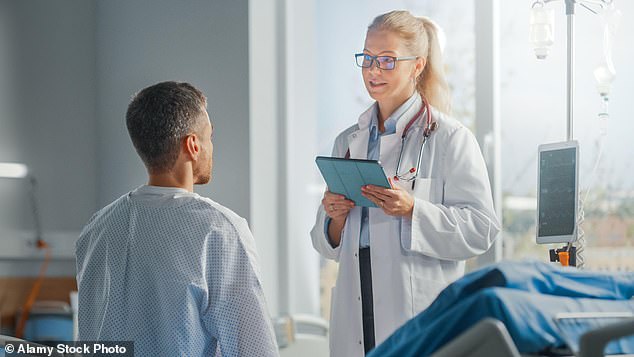[ad_1]
I have had heart palpitations on and off for some time. I’ve had an ECG but this didn’t reveal anything abnormal. Do I need treatment?
Dr Ellie responds: Palpitations involve the heart racing or beating abnormally. Some people may notice a thumping or feel an irregular heartbeat.
Sometimes this is accompanied by breathlessness or the need to cough.
Palpitations can be triggered by the menopause, strenuous exercise, a lack of sleep, stress, alcohol, caffeine, nicotine and certain medicines.
While uncomfortable, palpitations caused by one of these factors are not dangerous.
However, heart palpitations can also be a sign of a potentially worrying heart rhythm condition.
For example, atrial fibrillation triggers an unsteady heartbeat and is caused by a problem with the electrical system that makes the heart beat.
Atrial fibrillation also often leads to chest pain, difficulty exercising and shortness of breath. There are medicines that can control the rate and rhythm of the heart, such as beta blockers.
Atrial fibrillation patients may also need surgery to manage the problem. In order to spot the cause of palpitations, patients are often told to wear a device called an electrocardiogram (ECG), which measures heart rhythm, for as long as five days.
This is because, for some patients, palpitations may occur only occasionally, making them difficult to pick up on a quick test.
Patients who continue to have palpitations with no clear cause should ask their GP for further tests in order to find the trigger.

It is important to remember that all conversations with a GP are confidential and cannot be shared with others without the patient’s consent
I’m 64 and recently found out my new partner is HPV positive. I want to get tested but my GP is also my neighbour, and I’m embarrassed to talk to her about my sex life. What should I do?
Dr Ellie responds: If personal relationships with a GP make it difficult to seek medical advice, registering with a different practice may be the most appropriate option.
All conversations with a GP are confidential and cannot be shared with others without the patient’s consent.
However, some people understandably feel uncomfortable discussing sensitive topics with someone they know socially.
In such cases, switching GP practices is straightforward and can be done via the NHS website: nhs.uk/service-search/find-a-gp.
HPV – human papillomavirus – is a very common viral infection, typically passed on through sexual contact.
Around eight in ten people will contract it at some point and, in most cases, it is harmless. However, in rare instances it can lead to cancer.
It is the primary cause of cervical cancer, which is why NHS cervical screening includes HPV testing for women aged 25 to 64.
Women over this age are not routinely screened, as evidence suggests that a new HPV infection at this age is unlikely to progress to cervical cancer. This is because cancerous changes in the cervix usually take decades to develop.
For those over 65 who missed their final cervical screening, an HPV test can still be requested. The most reliable way to access this is through a sexual health clinic, as not all GP surgeries offer the test, whereas all NHS sexual health services do.
My knees are weak. They aren’t sore or inflamed, but when I crouch down I can’t get up unless I push off the floor with my hands. What could be the reason?
Dr Ellie responds: Weakness in the legs is unlikely to be caused by an issue with the knees. Instead, there’s a greater chance that it’s due to problems in the surrounding muscles. Knee problems, like arthritis, tend to trigger pain in the joint or visible swelling.
In later life, many people develop a condition called sarcopenia. This is where the muscles slowly reduce in size.
The best way to combat sarcopenia is to undertake strength-training exercises. These include lifting weights, using exercise bands and doing squats and lunges. These exercises are proven to build and maintain strong muscles.
This is different to cardiovascular exercise, such as running or swimming, which is also good for the body but won’t necessarily fend off sarcopenia.
The knees are primarily supported by the quadricep muscles, also known as the quads, which make up the front of the thigh.
Anyone struggling with strength in this area of the body might benefit from a few sessions with a physiotherapist or personal trainer who can teach you some exercises that might help. Any sudden and severe muscle weakness should be investigated by a GP as it can be a sign of disease, such as an autoimmune condition like thyroid disease or lupus. A GP can run blood tests to rule out these problems.
Muscle weakness can also sometimes be a side effect of certain medications such as statins.
[ad_2]
This article was originally published by a www.dailymail.co.uk . Read the Original article here. .


